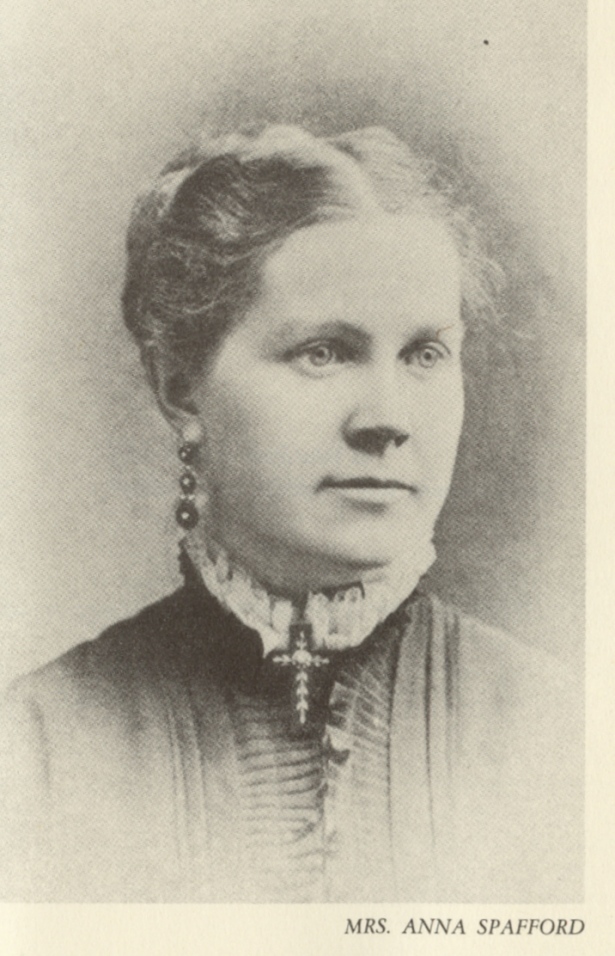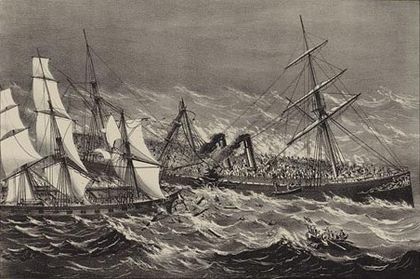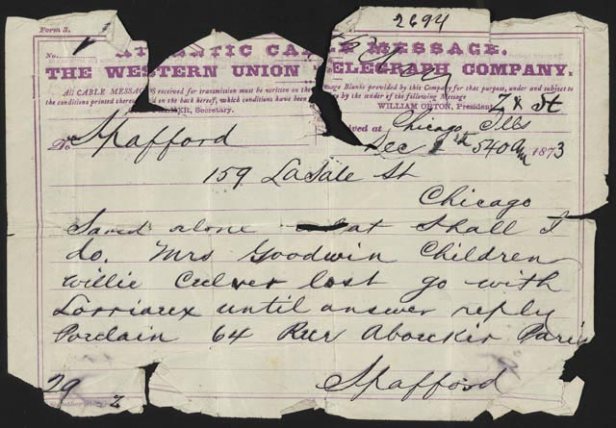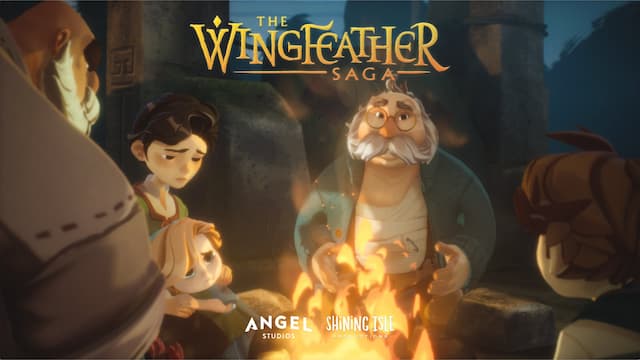Trust in the Midst of Loss: A Story of Great Faith
Ever have those days—even seasons—when you wondered what God was doing? Or wondered where He was? I have, and I’m guessing you have too.
 Anna Spafford had those questions. Her husband had invested heavily in Chicago real estate, but the great Chicago fire of 1871 destroyed his sizable investment. It was a devastating ordeal, but Anna and her family survived. Yet two years later, she faced a far more harrowing ordeal.
Anna Spafford had those questions. Her husband had invested heavily in Chicago real estate, but the great Chicago fire of 1871 destroyed his sizable investment. It was a devastating ordeal, but Anna and her family survived. Yet two years later, she faced a far more harrowing ordeal.
Anna had booked passage on the SS Ville du Havre, a French ship bound for Paris. She was going to spend some time in Europe for the sake of her health. Unfortunately, the ship never made it there. On November 22, 1873, one week after leaving New York, the Ville du Havre struck another ship, the Loch Earn. The captain of the Loch Earn saw the impending collision and tried to warn the Ville du Havre, but it was too late. While the Loch Earn was damaged, it was the Ville du Havre that took the greatest damage. It sunk in twelve minutes.
Let that soak in. It took the Titanic two hours and forty minutes to sink. The Ville du Havre went down in a fraction of that time. Once the passengers were notified, they had little time to prepare or save themselves. The ship had bright and shiny lifeboats, but they were bright and shiny because they had been freshly painted. When passengers and crew ran for the lifeboats, the freshly painted boats were stuck to the deck! In those brief twelve minutes, only a few boats were pried free of the deck.

Of the 313 people on board, only 87 survived. And Anna Spafford was one of them.
The ship they had struck, the Loch Earn, took on the survivors. They were safe—for the moment. The Loch Earn had also sustained damage, and the overcrowded ship was destined to sink too. Thankfully, the Tremountain, an American ship, was close at hand, and it rescued all those on the Loch Earn.
We might wonder why Anna wasn’t thanking God for saving her life—twice. Why the questions? But I haven’t told you the full story.
Anna wasn’t traveling alone.

She was traveling with her four daughters, ages 2-9, and all four were lost at sea. She told a fellow passenger, “God gave me four daughters. Now they have been taken from me. Someday I will understand why.” When the survivors reached Wales, she immediately wired her husband, Horatio, who was back in Chicago: “Saved alone. What shall I do?“
For those of us who have lost a family member, we know the numbness that comes with grief. Even as we grieve our loss, we wonder what we’re going to do now. How am I going to move forward? We feel the loss, and we feel at a loss. And for Anna Spafford, that loss was four-fold.
Anna’s husband immediately booked passage to England to be with his wife, to comfort her, and to bring her home. He too had experienced great loss: four young daughters he loved deeply.
On the journey across the North Atlantic, the ship followed he same course the Ville du Havre had. The captain knew of Horatio’s loss, so as they neared the spot where the Ville du Havre went down, the captain made Horatio aware of the location.
We might wonder what a grief-stricken father might think of such a tragedy. We wonder how we would react if we were in his shoes. But Horatio Spafford’s faith kept things in perspective for him. Even while he grieved, he trusted. As he later wrote to his sister-in-law:
“On Thursday last we passed over the spot where she went down, in mid-ocean, the waters three miles deep. But I do not think of our dear ones there. They are safe, folded, the dear lambs.”
We have more than this letter to help us see into Horatio’s heart and faith. On the same voyage, he wrote these words:
When peace like a river, attendeth my way,
When sorrows like sea billows roll;
Whatever my lot, Thou hast taught me to say
It is well, it is well, with my soul.
Spafford’s words have become one of the most loved hymns in America. His words do not reflect a resignation to what happened, but a trust in the sovereign, loving Lord of the universe. Spafford did not understand why this tragedy happened, but he knew His Lord well enough to trust Him. In another verse, which we never sing, he wrote:
For me, be it Christ, be it Christ hence to live:
If Jordan above me shall roll,
No pang shall be mine, for in death as in life,
Thou wilt whisper Thy peace to my soul.
 We don’t have to fully understand in order to trust and to experience God’s overwhelming peace. I don’t have to know the why so long as I know the One who does. So whatever comes my way … it is well with my soul.
We don’t have to fully understand in order to trust and to experience God’s overwhelming peace. I don’t have to know the why so long as I know the One who does. So whatever comes my way … it is well with my soul.
If you want to know the rest of the story …
Horatio Spafford had done quite well as a lawyer, but the many tragedies he and Anna faced—they had other children after this, but one died from scarlet fever—led them to see that material possessions and worldly success were wholly unimportant. They joined a small group of others and moved to Jerusalem. This group came to be known as the American Colony in Jerusalem, and they were known for their philanthropic work with all people regardless of their religious beliefs.
Spafford’s heart is captured in what he wrote in his diary in August 1882:
“I rely exclusively, exclusively on the power and grace of God in [Christ]. I am a miracle of grace!”
Subscribe to this blog or like our Facebook page. And share this post with others.



